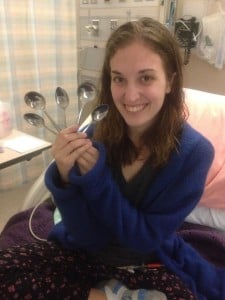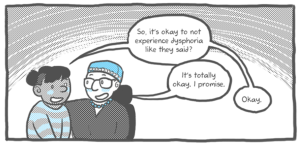Text: The Problem with Poodle Science
Narrator: There’s a big problem at the center of our research on weight and health. What’s the problem? Well, picture a society made up of dogs. Let’s say poodles are the bossiest group.
They’re the ones you see down at the doggy park barking at all the other dogs about how to live their lives in order to be healthy.
But the problem is, poodles think that every other kind of dog is just a really big, a really small, or a really fat poodle. When actually, the other dogs aren’t even poodles at all. They’re terriers, or mastiffs, or greyhounds, or labs.
And all of the thousands of different dog breeds have different lifespans and different health risks. Each one is evolved to use food differently for different specialties at surviving; some for staying warm, some for running fast, and some for being strong. They’re meant to be different sizes and weights.
So, the poodles think the mastiffs should lose weight, but a starving mastiff never becomes a poodle. The poodles don’t understand that dogs come in many more sizes than they can imagine in their poodle-centric ways. So this becomes a problem when it comes to poodle science.
When the poodles did their weight and health research and made their claim that lighter dogs are healthier and live longer, they weren’t comparing thinner poodles and fatter poodles. They were comparing poodles and mastiffs. So the recommendation for mastiffs to lose weight is based on the false assumption that if all dogs reach poodle weight, then all dogs will have poodle health.
But once again, a starved mastiff just isn’t a poodle. This poodle science doesn’t even test whether a starved mastiff lives longer than a mastiff to has enough to eat, because one would have to compare mastiffs who maintain poodle weight to mastiffs that maintain mastiff weight.
It turns out, that starving mastiffs regain weight, which after all, was a much better thing than starving. But the poodles can only see that regain as a failure of mastiff’s self-discipline.
Look, poodles are great. But poodle-centric health policy is a nightmare. Good science tells us that it’s better to recognize and respect the ways we’re different, because how we’re treated, having good friends, having access to decent food, a place to play, restful sleep, and medical care make a huge difference in our health and longevity for all of us, whatever our size.




















